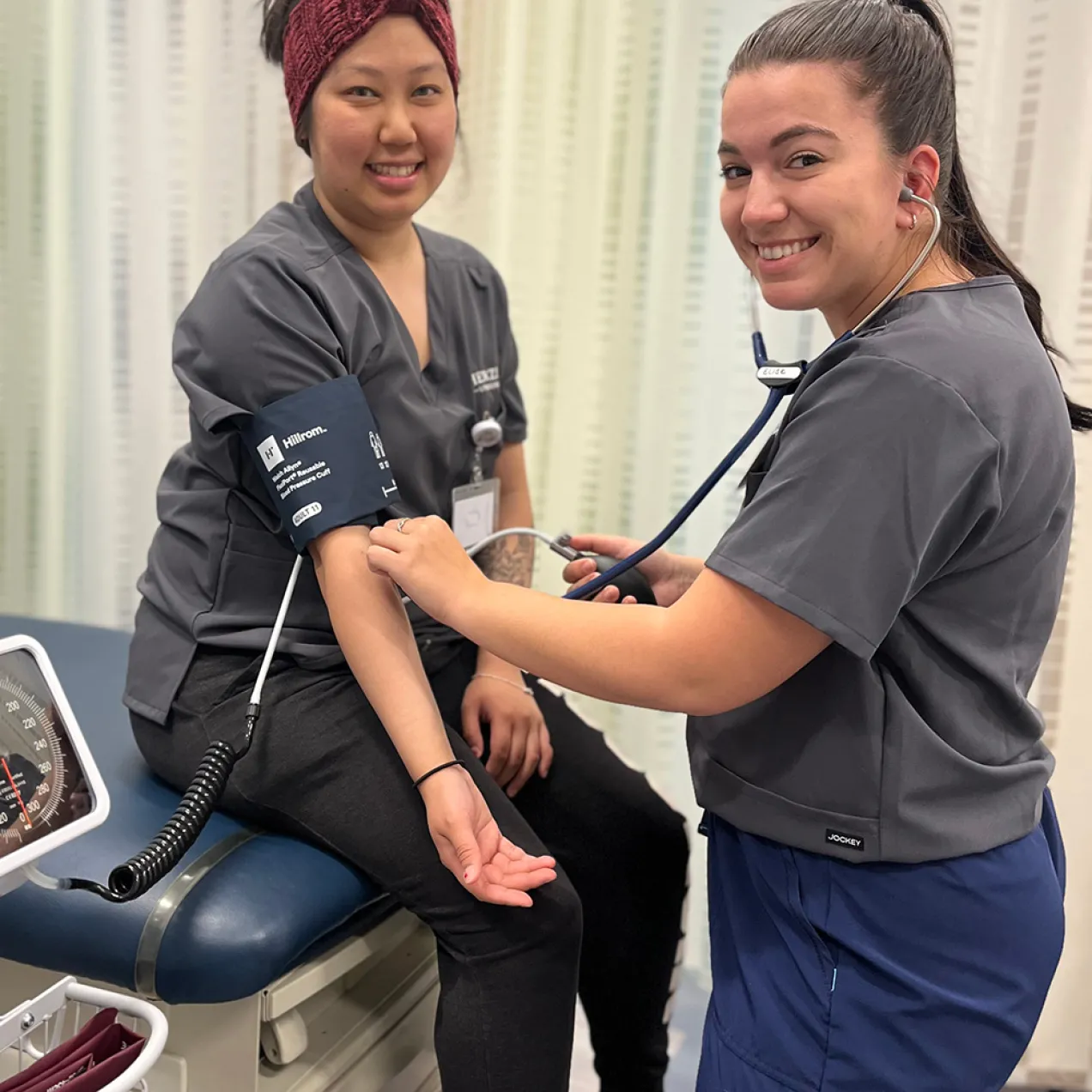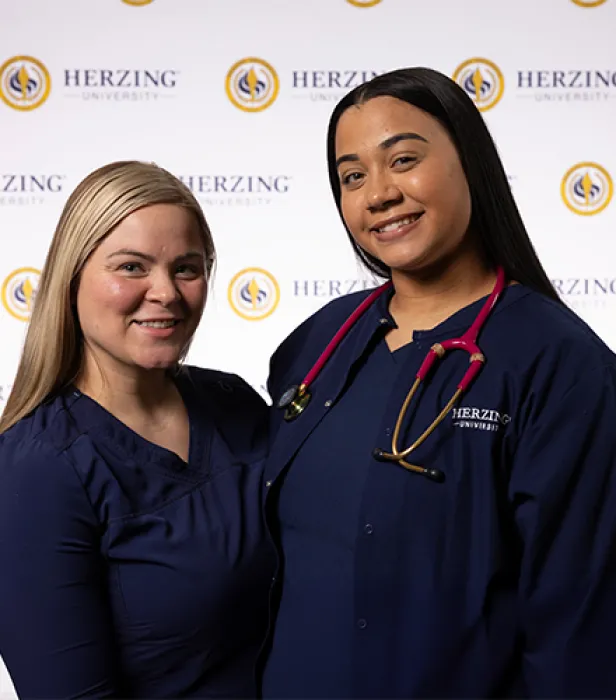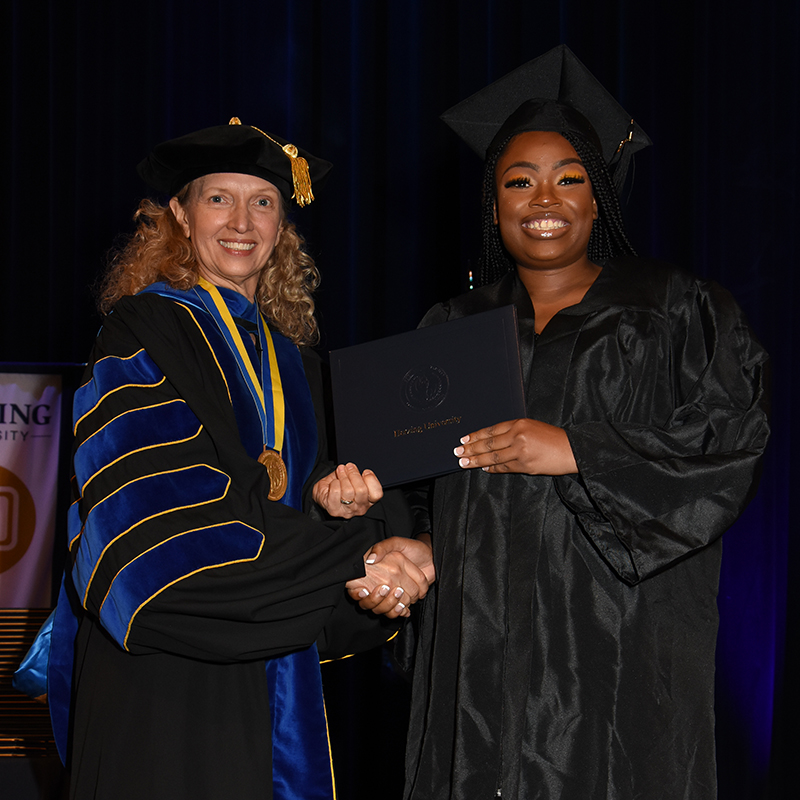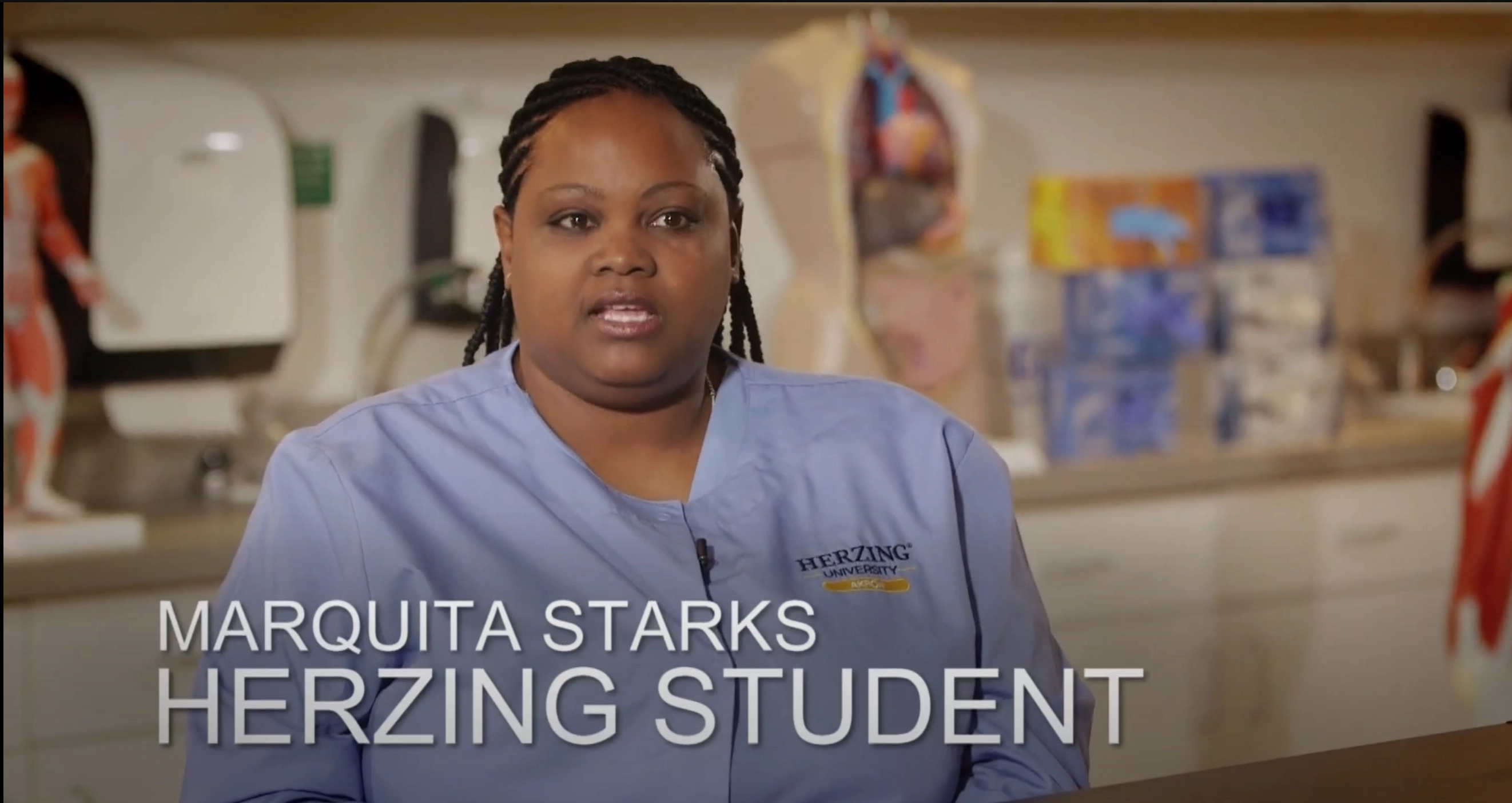Pathways
Follow your career pathway with Herzing

- Program length: 10 months
- Classes: View the curriculum
- Credential earned: Diploma in Medical Assisting

- Program length: 20 months
- Classes: View the curriculum
- Credential earned: Associate of Science in Medical Assisting Services

Satisfaction rate
Our overall student satisfaction rate, according to the 2024 Herzing Graduate Survey.
Quick facts about our online medical assisting program
| Accreditation | Accredited by the Higher Learning Commission |
|---|---|
| Programs | Multiple undergraduate options: choose a diploma or associate degree program |
| Transfer credit | Up to 18-45 approved credits |
| Format | Online classes + hands-on clinical labs & externship |
| Certification | Prepare for the Certified Clinical Medical Assistant (CCMA) or Registered Medical Assistant (RMA) certification exam – we pay for your first attempt! |
| QuickPaths | Discover career advancement possibilities in one of Herzing’s many bachelor’s degree options in healthcare, including health sciences, healthcare administration—or even nursing |
Learn More Today!
Your future as a medical assistant begins here
Medical assisting options include diploma and associate degree programs which prepare you for a career as a medical assistant.
Our online programs provide fundamental knowledge and skills in medical terminology, administrative skills for the medical office, insurance claims, processing and adjudication, ethics and professionalism, and much more.

Career-focused curriculum
Discover the crucial knowledge and skills required to succeed in your work and build a foundation for continued career growth.
Flexible schedule
We work hard to help you maintain school-life balance, striving to be as flexible as possible for busy non-traditional students.
Virtual services
Access to extensive virtual services, including academic advising, tutoring, support services, technical support and library services.
Lifelong support
We support your ongoing career advancement by providing comprehensive, personalized student services with lifelong career coaching.
Rolling admissions
No application deadlines to worry about. Apply when you’re ready and prepare to get started soon.
Clinicals & Externship: how the program works
There are two requirements to complete the medical assisting program outside of regular classes:
Clinical Labs
Two terms prior to the externship, you will be required to take two clinical courses. Most coursework will be completed online, but you will also be required to meet with a proctor at a healthcare facility (possibly a Herzing campus) to demonstrate mastery in medical assisting skills. Prior to your labs you will need to take and pass a Student Readiness Training (SRT) proctorship. You must complete a Basic Life Support (BLS) CPR class from the American Heart Association or the American Red Cross as part of the requirement.
Externship
You will complete 180 hours at a medical clinic or doctor’s office in an eight-week period during your final term—Monday-Friday during daytime hours. Depending on the requirements of your externship site, expect about 25-40 hours per week. Herzing’s clinical coordinator can assist you in your search, but it will be your responsibility to locate and secure a proctor and externship site in your geographic area during your Student Readiness Training Seminar (SRT).
Finding a proctor for your clinicals. Herzing’s Proctor Prep SRT seminar provides guidance on how to search and secure a proctor to assist in your clinical courses. This course is usually scheduled two terms before the first clinical course. In order to succeed, you’ll need to be in frequent communication with the SRT instructor. You will have access to a clinical coordinator who will assist in your search, but ultimately it is your responsibility to secure proctorship.
Contact us and we can provide answers to any further questions you have about the clinical/externship component of the medical assisting program.
Get educated and certified
Our goal is to maximize your chance of finding a job as soon as possible after graduation.
That’s why both our diploma and associate degree curriculums include prep for key medical assisting certification exams:
- Diploma program: Certified Clinical Medical Assistant (CCMA) from the National Healthcareer Association (NHA)
- Associate degree program: Registered Medical Assistant (RMA) from the American Medical Technologists (AMT)
In each program we pay for your first attempt upon successful completion of the program.
After earning your diploma or degree and a certification you’ll be ready to become a vital contributor for a team of healthcare professionals.1
Your many career possibilities in medical assisting



Medical assistants are typically responsible for a variety of clinical and administrative tasks, including scheduling appointments, insurance claims, preparing exam rooms, taking patients’ weight and vital signs, drawing blood and potentially much more. Exact scope of practice will vary by state, and every employer will have their own expectations depending on the position.
Medical Assistant Ranked #5 Best Health Care Support Jobs of 2025 by U.S. News & World Report
You will collaborate with nurses, doctors and other healthcare professionals to deliver the best possible patient care. This can be a really good next step for current nursing assistants (CNA) looking to advance their healthcare career outside of nursing.
Medical assisting represents a strong foundation to not only join a growing field, but to gain meaningful healthcare experience and advance your career to the next level.
More interested in an administrative role? If you have a preference for office administration tasks more so than direct patient care, you can pursue an education directly focused on these areas. Learn more about our online medical office administration program (diploma and associate degree options available).
Job Outlook
According to the Bureau of Labor Statistics, employment of medical assistants is expected to increase 14% from 2022-2032, much faster than the average across all U.S. occupations.*
Now is a great time to begin working towards becoming a medical assistant and join a career path poised for excellent growth.
Faq
Frequently Asked Questions
Didn't find the answer to your question? Send us an inquiry and we will be happy to answer all your questions!
According to the Bureau of Labor Statistics, these are the most common places of employment for medical assistants:
- Physician’s offices
- Hospitals
- Offices of other health practitioners
- Outpatient care centers
- Retirement communities / assisted living
Because medical assistants can wear so many different hats there are many important skills needed to thrive in different healthcare environments:
- Professionalism. In many positions you will need to handle customer service tasks, basic patient care and clearly communicate physician information to patients. Medical assistants must demonstrate professionalism and tact when interacting with patients.
- Attention to detail. Medical assistants may gather patient contact or insurance information and keep medical records organized. You must be meticulous and highly detail oriented to succeed.
- Compassion. Making patients comfortable and empathizing with their concerns is crucial ensuring patients are calm and collected for medical procedures.
- Multi-tasking. Staying organized and measured in the face of quickly changing circumstances and a lengthy “to-do” list will make you indispensable to a healthcare team.
These are just a few key medical assistant skills that will help you excel in medical assisting and beyond to many other career opportunities in healthcare.
With Herzing University, an affordable, career-focused education is within your reach. We are always striving to make college more affordable for everyone.
- Student loans & secured loans. Loans offer a way to pay for all or part of your tuition.
- Scholarships. We offer a variety of scholarships based on academic achievement, financial need or community affiliations. Contact an admissions advisor about current scholarship opportunities by calling 1-800-596-0724 or request for information online.
You can find an estimate for grant and scholarship aid using the net price calculator, and find an estimate for tuition for the online medical assisting program using Herzing University’s tuition wizard.
While practical nurses (LPN) and medical assistants often perform similar tasks, there are a few key differences to be aware of, including:
- Educational requirements
- Average salary
- Scope of practice
- Ongoing career opportunities
- Future outlook for jobs
Learn more about the difference between practical nursing and medical assisting and how to go from MA to LPN.
Students in the online program will take the RMA exam during their review course – which is a requirement to pass. Herzing will pay for the exam once.
Certification is not always required, but job duties may be limited in certain states if you don’t get certified.
Even if you aren’t legally required to be certified, many employers will require certification and it will make you available for more job opportunities, better pay and greater chance for advancement.
Sitting for and passing either the Registered Medical Assistant (RMA) exam or Certified Clinical Medical Assistant (CCMA) exam may open many more doors to start your career as a medical assistant.
How long it takes to become a medical assistant depends on what level of education you pursue. Partner with Herzing University and you can expect a range of 10 months–20 months to get your education, get certified and start looking for a medical assistant position, depending on whether you choose a diploma or degree program.
The following timelines are based on full-time status:
- Associate degree: 20 months
- Diploma: 10 months
After earning your degree or diploma, we recommend becoming certified as a Certified Clinical Medical Assistant (CCMA) even if it isn’t required in your state. With a diploma/degree and a certification, you’ll be positioned well for your first job.
According to the Bureau of Labor Statistics (BLS), medical assistants earn an average salary of $43,350 per year ($20.84 per hour).* As you earn more experience and gain more skills, your earning opportunity will improve.
The BLS also projects growing demand for medical assistants in coming years, predicting an 14% increase in employment from 2022-2032. It’s a good time to get your foot in the door and work towards your new career.
Medical assistants typically have a greater role in patient care, and may perform tasks like taking vital signs, providing injections or medications or aiding in patient exams.
Medical office/administrative assistants practice in a clerical role rather than in direct patient care, responsible for organizing patient records, scheduling appointments, answering phones or filing paperwork.
The online medical assisting program (both diploma & degree) feature three main components:
- Online classes. Much of the coursework can be completed in the online component of the program.
- Clinical labs. You will be required to complete two clinical courses and meet with a proctor outside of class to ensure you are mastering key medical assisting skills.
- Externship. Over an eight-week period during your final term you will be required to complete 180 hours of hands-on experience in a medical clinic or healthcare facility. We can guide you in your search, but it is your responsibility to find and secure an externship site.
Our goal is to fully prepare you to thrive in your new career. The clinical and externship hands-on component of the program is crucial to helping you get the experience you need to become a medical assistant right out of school.
Your choice depends on the career path you’d like to pursue.
If your number one priority is finding a job as a medical assistant as quickly as possible, a diploma program may be a better choice. You can earn a diploma in a year or less when attending full-time and be ready to enter the workforce as a certified medical assistant.
If you envision medical assisting as step one on a long career path in healthcare, you may prefer to choose the associate degree program. In addition to core medical assisting courses, you will take general education classes you can transfer into a bachelor’s degree program in the future. Baccalaureate options for medical assistants include healthcare administration, health sciences and health information management. Earning an associate degree will likely only take a few months longer and position you very well for the next step in your education.
Program Finder
Associate Degree in Medical Assisting Services
On Campus OnlineTo learn more about this program, click the Request Info button.
Diploma in Medical Assisting
OnlineTo learn more about this program, click the Request Info button.
Request Information
Ready to get started?
Contact us to request more information
The Student Experience at Herzing
My hard work paid off and I secured a job at the clinic where I completed my clinical hours!
Destinie Henley
Healthcare Student | Online CampusThe online program was so convenient for me and my busy life! I wouldn’t change how I did my program at all!
Elizabeth Ledoux
Healthcare Student | Online CampusIt was all worth it! I loved the hands-on experience.
Tieshia Mcelroy
Healthcare StudentI love helping people. My goal in life is to help others by doing whatever makes them happy, and I am going to do that with this degree!
Nariah Jenkins
Healthcare Student | Brookfield/Milwaukee CampusI am thankful for attending a school that encouraged me to start and pushed me toward not only finishing but finishing as a stronger person!
Chelsea Kendall
Healthcare Student | Online CampusChange Your Life with a Degree From Herzing
Herzing University is here to help change your life for the better. By enrolling, Herzing will work with you to help earn your degree and make you possible.
"I chose Herzing University because I felt like part of the Herzing family before I even began school," says Herzing University student Marquita.
Recent Blog Posts
Accreditation & Disclosures
1. Certification in this program is not a state requirement.
Herzing University is accredited by the Higher Learning Commission (hlcommission.org), an institutional accreditation agency recognized by the U.S. Department of Education.
View Herzing University Accreditation and Approvals
- Alabama
- Alaska
- Arizona
- Arkansas
- California
- Colorado
- Connecticut
- Delaware
- District of Columbia
- Florida
- Georgia
- Hawaii
- Idaho
- Illinois
- Indiana
- Iowa
- Kansas
- Kentucky
- Louisiana
- Maine
- Maryland
- Massachusetts
- Michigan
- Minnesota
- Mississippi
- Missouri
- Montana
- Nebraska
- Nevada
- New Hampshire
- New Jersey
- New Mexico
- New York
- North Carolina
- North Dakota
- Ohio
- Oklahoma
- Oregon
- Pennsylvania
- Rhode Island
- South Carolina
- South Dakota
- Tennessee
- Texas
- Utah
- Vermont
- Virginia
- Washington (AS only)
- West Virginia
- Wisconsin
- Wyoming
- The Virgin Islands
* Bureau of Labor Statistics (BLS), U.S. Department of Labor, Occupational Employment and Wage Statistics 2023 / Occupational Outlook Handbook 2022. BLS estimates do not represent entry-level wages and/or salaries. Multiple factors, including prior experience, age, geography market in which you want to work and degree field, will affect career outcomes and earnings. Herzing neither represents that its graduates will earn the average salaries calculated by BLS for a particular job nor guarantees that graduation from its program will result in a job, promotion, salary increase or other career growth.
Waived Enrollment Fee
Discover the educational pathway designed to maximize your career potential. Reach for greater heights with Herzing University.









